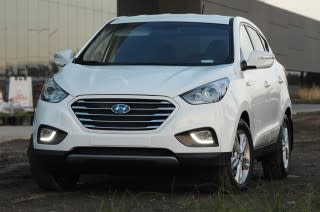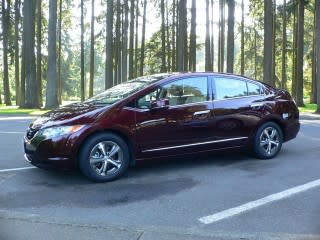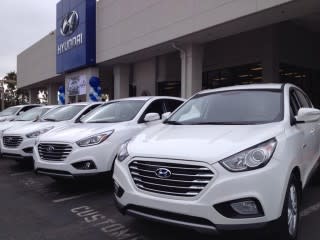Hydrogen Fuel-Cell Car Questions: Toyota, Honda & Hyundai Respond (Part 1)
Next week, the Toyota Fuel Cell Sedan will be introduced in detail at the Los Angeles Auto Show, possibly with a new model name (rumored to be Mirai).
Small numbers of Hyundai Tucson Fuel Cell crossovers are now on the road, and Honda will launch its next-generation hydrogen fuel-cell car within two years.
DON'T MISS: 10 Questions On Hydrogen Fuel-Cell Cars To Ask Toyota, Honda & Hyundai
In other words, expect to hear a great deal more about fuel-cell vehicles in the coming years--despite the small numbers of them that will appear on actual roads by 2020.
Last month, we published an article suggesting 10 questions that carmakers should be prepared to answer as they launch hydrogen fuel-cell vehicles.
![Toyota Fuel Cell Sedan at Aspen Ideas Festival [photo: Riccardo Savi]](https://s.yimg.com/ny/api/res/1.2/1SvME16vsFByDkGQr1Jx8Q--/YXBwaWQ9aGlnaGxhbmRlcjt3PTY0MDtoPTQyNg--/https://s.yimg.com/os/en_US/Autos/GreenCarReports/toyota-fuel-cell-sedan-at-aspen-ideas-festival-photo-riccardo-savi_100478377_s.jpg)
It generated enough discussion (and 600 comments!) that all three carmakers agreed to provide formal responses to the questions.
Answers, annotations, sources
We've now received those answers, and the California Fuel Cell Partnership chimed in on seven of the 10 questions as well.
Hyundai provided the most detailed response: six single-spaced pages with copious reference links; the Fuel-Cell Partnership was briefest, at two pages.
The Korean maker also spent by far the most time underscoring the shortcomings of battery-electric vehicles.

After assessing the volume of material, we decided it needed to be summarized rather than reproduced verbatim, to let readers compare the positions taken by the automakers, along with some analysis on our part.
The first of several topics are the three questions we had grouped under the heading, "Comparisons to Battery-Electric Vehicles."
QUESTION 1
The main advantage of hydrogen vehicles is that they can refuel for 300 miles in less than 10 minutes. The Tesla Model S can now Supercharge to get 200 miles in 20 minutes, and some analysts suggest larger batteries can be DC quick-charged in the future at even higher power than Tesla's 135 kilowatts.
If an affordable battery-electric car in 2020 offers 250 miles of range and can recharge to 80 percent in, say, 12 to 15 minutes--then how much of an advantage will hydrogen fuel-cell cars retain?
The general response here suggested that comparing today's fuel-cell vehicles to hypothetically better electric cars at some future point wasn't particularly useful, or fair.

Fuel-cell cars today provide 300 miles of range or more, with refueling in as little as 3 minutes. That range number too is expected to rise over time--with no concern over degradation of the fuel-cell stack itself.
Hyundai was most pointed: "We can all speculate about future potential product innovations, like advanced battery technologies, but at this point they are just that: speculation."
Battery-electric drawbacks
As in its other responses, the Korean maker was fairly direct in highlighting the drawbacks of battery-electric cars.
In this case, Hyundai added, "The fact remains, there are still concerns over the impact of DC fast-charging on battery durability and longevity"--and cited a passage from the Nissan website that recommends owners "minimize" the use of fast charging to lengthen battery life.

It also noted that DC fast-charging is not widely available, saying it is "primarily limited to commercial and industrial areas with access to 3-phase, high-voltage, and industrial-grade electric service" and noting that fast charging at home is "just not viable at this time."
Finally, Hyundai put some brackets around Tesla Supercharging. It suggsted that Model S owners either had to buy the $10,000 battery upgrade (which a vast majority already do) or pay $2,000 more for the higher-power onboard charger.
![2013 Tesla Model S at Supercharger station in Springfield, Oregon, Nov 2013 [photo: George Parrott]](https://s.yimg.com/ny/api/res/1.2/M.LEpmJWPom.Xy3LRAVgug--/YXBwaWQ9aGlnaGxhbmRlcjt3PTY0MDtoPTQzMg--/https://s.yimg.com/os/en_US/Autos/GreenCarReports/2013-tesla-model-s-at-tk-nov-2013-photo-george-parrott_100449151_s.jpg)
And it quoted Tesla's own website in saying that a 30-minute charge at a Supercharger station provides about 170 more miles in an 85-kWh Tesla Model S, with 20 minutes giving only a 50-percent recharge.
Suited to larger vehicles
Honda simply highlighted the 300-mile range, and refueling time comparable to gasoline cars, of fuel-cell vehicles.
It also noted that fuel-cell powertrains can be used in a variety of vehicles. In Honda's eyes, we might add, this likely applies to larger segments like minivans, SUVs, perhaps even pickup trucks.
Toyota too highlighted the advantages of fuel cells in larger vehicles, noting that half of all new vehicles sold in the U.S. are now pickup trucks, minivans, SUVs, and crossover utility vehicles.
![Toyota Fuel Cell Sedan pre-production prototype, Southern California, Sep 2014 [Mike Magrath]](https://s.yimg.com/ny/api/res/1.2/gdYpP04uB7XuCExOst0g9w--/YXBwaWQ9aGlnaGxhbmRlcjt3PTY0MDtoPTQzMA--/https://s.yimg.com/os/en_US/Autos/GreenCarReports/toyota-fuel-cell-sedan-pre-production-prototype-southern-california-sep-2014-mike-magrath_100480958_s.jpg)
"We see the potential for fuel-cell expansion across a variety of platforms in the future," Toyota said, even though its "initial offering is a sedan."
In contrast, Toyota said, "To scale up in vehicle size, there are exponentially diminishing returns to adding battery, as the added weight requires added structural reinforcements and decreases vehicle efficiency."
OUR TAKE: Saying that you can't compare today's fuel-cell cars to hypothetical future electric cars is fair, certainly. But none of the four respondents actually answered the question we posed: If future DC fast-charging brings "refueling time" for battery-electric cars closer to that of hydrogen vehicles, is there still an advantage?

 Yahoo Autos
Yahoo Autos 
